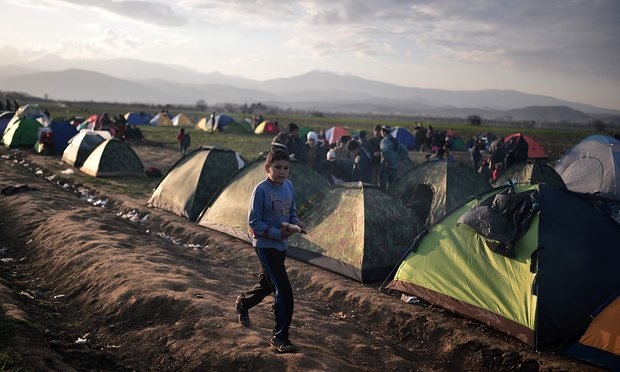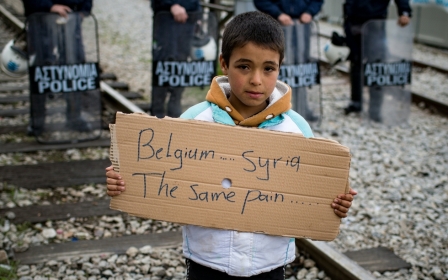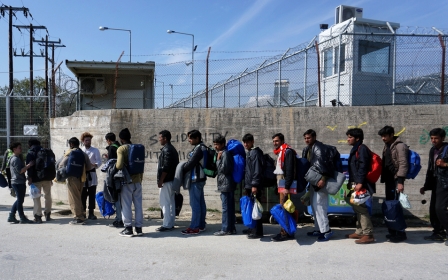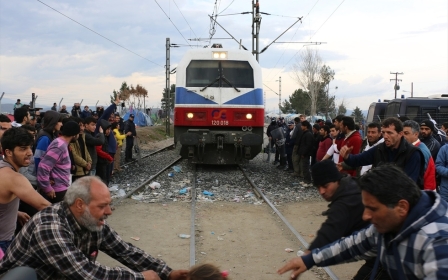Thousands rush to squalid camp on Greek border in hopes of crossing northwards

Hundreds of hopeful refugees flooded back to Greece's overwhelmed Idomeni camp on the border with Macedonia on Sunday following rumours that the closed frontier would be forced open.
The renewed influx came as Greek authorities continued attempting to evacuate an estimated 11,500 people who were stranded at the squalid camp after Balkan states slammed shut their borders, cutting off the migrant route to the European Union.
By late morning, around 250 people of all ages had gathered by the railway tracks and the border fence, singing and shouting slogans, an AFP correspondent said, in a largely peaceful demonstration watched by around 50 Greek policemen in riot gear.
"No violence, we just want to cross," read one banner, while another said: "Freedom of movement is everybody's right."
The wave of new arrivals appeared to be triggered by a rumour that international journalists and Red Cross officials would help them force their way across the fence into Macedonia, a young Syrian refugee told the Athens News Agency.
"We heard today that the border will open and we came here to cross," he said.
"They told us the Red Cross and 500 journalists from all over the world will be with us," he said, without specifying the source.
Another young Syrian refugee said his sister, who is living in Germany, read the same claim on the Internet and alerted him.
"People have been here for a long time. I think it's very dangerous to cross, especially for the children but what should we do?" 24-year-old Qasim Mosawy from Afghanistan told AFP.
Dozens of other migrants could be seen heading through the fields towards the Idomeni crossing, an AFP reporter said.
'Creating false hope'
"We are trying to step up our information campaign to the refugees. Some people, for reasons we don't understand, are creating false hope," said Giorgos Kyritsis, spokesman of the SOMP agency, which is coordinating Athens' response to the refugee crisis.
Using loudspeakers, Greek officials told those gathering that the crossing would remain closed, repeating the message in both Arabic and Farsi, the Athens News Agency said.
Two weeks ago, hundreds of people were stopped by Macedonian troops after crossing a surging river on the border. Bypassing the regular crossing, they tried to wade through the fast-flowing water, clinging to a rope strung between the banks in order to cross the frontier.
Three Afghan migrants, including a pregnant woman, drowned. The rest were stopped by Macedonian troops and sent back to Greece, along with journalists travelling with them.
"Macedonia will not allow [the] reopening of the Balkan route," said Ivica Bocevski, a representative of President Gjorge Ivanov, in the wake of the incident.
The bottleneck has left a total of around 50,000 refugees and migrants stranded across Greece, which has stepped up efforts to clear out the makeshift camp at Idomeni.
On Friday and Saturday, 11 buses transported around 600 refugees from Idomeni to other camps in northern Greece.
Those persuaded to board the first buses were mainly parents with children who can no longer tolerate the difficult conditions there, but others are holding out at Idomeni.
"People who have no hope or no money, maybe they will go," said 40-year-old Iraqi Fatema Ahmed, who has a 13-year-old son in Germany and three daughters with her in the camp.
"But I have hope, maybe something better will happen tomorrow," she said.
New MEE newsletter: Jerusalem Dispatch
Sign up to get the latest insights and analysis on Israel-Palestine, alongside Turkey Unpacked and other MEE newsletters
Middle East Eye delivers independent and unrivalled coverage and analysis of the Middle East, North Africa and beyond. To learn more about republishing this content and the associated fees, please fill out this form. More about MEE can be found here.




